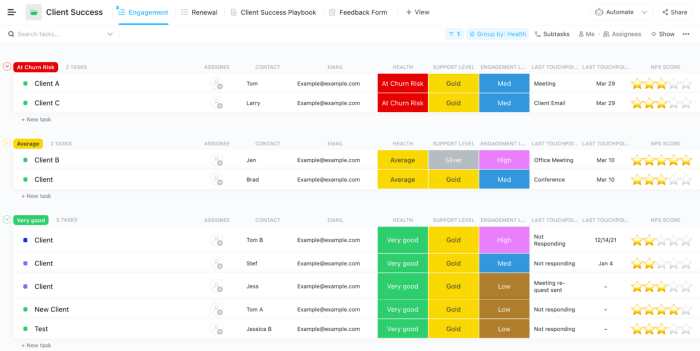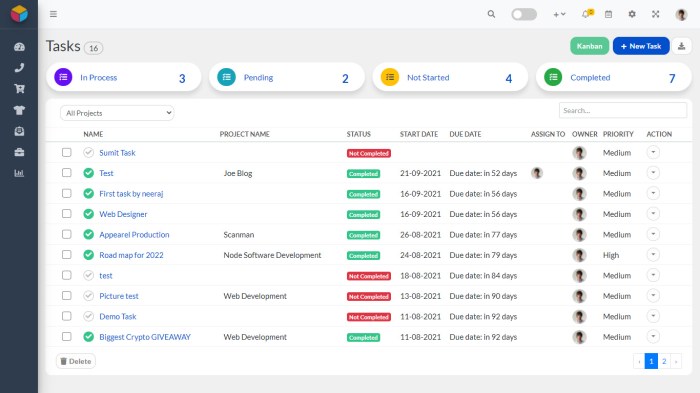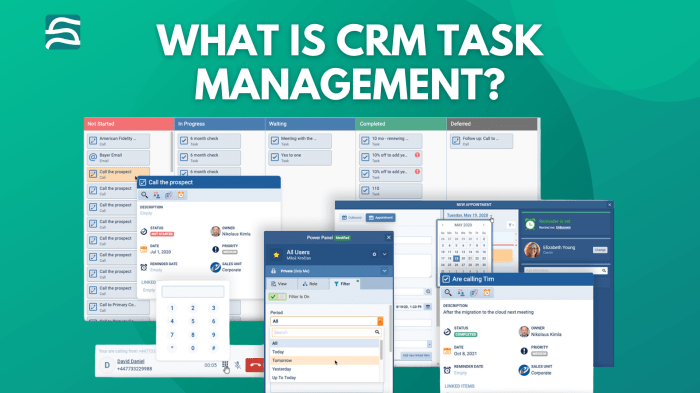CRM and task management software represents a powerful synergy, streamlining workflows and boosting productivity. Effective integration of these systems allows businesses to centralize customer interactions, manage projects efficiently, and ultimately, achieve greater operational success. This integration provides a holistic view of both customer relationships and ongoing tasks, fostering improved communication and collaboration across teams.
Efficient CRM and task management software streamlines workflows, boosting productivity. However, integrating billing seamlessly is crucial for complete business management; finding the right system involves exploring options like the best CRM and invoicing software available. Ultimately, choosing the right software depends on your specific needs, but a combined CRM and invoicing solution often proves beneficial for overall task management and financial tracking.
By utilizing a unified platform, companies can eliminate data silos, reduce manual processes, and gain valuable insights into their operations. This enhanced visibility allows for better resource allocation, improved decision-making, and ultimately, a more streamlined and efficient business model. The result is a more responsive and customer-centric approach to business operations.
In today’s fast-paced business environment, efficient organization and streamlined communication are paramount to success. This is where Customer Relationship Management (CRM) and task management software step in, offering powerful tools to boost productivity and foster stronger customer relationships. While often used separately, integrating CRM and task management functionalities can unlock even greater efficiency and synergy. This detailed guide explores both individually and as a unified solution, providing a comprehensive understanding of their benefits, features, and integration possibilities.
Understanding CRM Software: The Heart of Customer Interaction
CRM software, at its core, is designed to manage and analyze customer interactions and data throughout the customer lifecycle. From initial contact to post-sale support, a robust CRM system centralizes all relevant information, providing a 360-degree view of each customer. This holistic perspective empowers businesses to personalize interactions, improve customer service, and ultimately drive sales growth.
Key Features of CRM Software:
- Contact Management: Store and organize customer details, including contact information, purchase history, communication logs, and notes.
- Sales Management: Track leads, manage sales pipelines, forecast revenue, and automate sales processes.
- Marketing Automation: Segment customers, personalize marketing campaigns, and automate email marketing, social media engagement, and other marketing activities.
- Customer Service Management: Manage customer inquiries, track support tickets, and resolve issues efficiently.
- Reporting and Analytics: Gain valuable insights into customer behavior, sales performance, and marketing effectiveness through detailed reports and dashboards. This often includes sales forecasting and pipeline management reports.
- Integration Capabilities: Seamlessly integrate with other business applications, such as email marketing platforms, e-commerce systems, and accounting software. This is crucial for a unified data ecosystem.
Popular CRM Software Options:
- Salesforce
- HubSpot
- Zoho CRM
- Microsoft Dynamics 365
- SAP CRM
Task Management Software: Streamlining Workflow and Boosting Productivity
Task management software is designed to help individuals and teams organize, prioritize, and track tasks and projects. It provides a centralized platform for assigning tasks, setting deadlines, monitoring progress, and collaborating effectively. This enhances team productivity and ensures projects are completed on time and within budget.
Essential Features of Task Management Software:
- Task Creation and Assignment: Easily create, assign, and delegate tasks to team members.
- Prioritization and Scheduling: Prioritize tasks based on urgency and importance, and schedule them effectively using features like Gantt charts or Kanban boards.
- Progress Tracking and Monitoring: Monitor task progress, identify bottlenecks, and ensure projects stay on track.
- Collaboration and Communication: Facilitate communication and collaboration among team members through features like comments, file sharing, and real-time updates.
- Reporting and Analytics: Generate reports on task completion rates, project timelines, and team performance.
- Integration with Other Tools: Integrate with other applications, such as calendars, email clients, and project management software. This is particularly important for avoiding data silos.
Leading Task Management Software Solutions:
- Asana
- Trello
- Monday.com
- Jira
- Notion
The Synergistic Power of CRM and Task Management Integration
Integrating CRM and task management software creates a powerful synergy, enhancing efficiency and productivity significantly. By connecting these systems, businesses can streamline workflows, improve communication, and gain a more comprehensive view of their operations.
Benefits of Integration:, Crm and task management software
- Improved Customer Service: Directly assign customer service tasks based on CRM data, ensuring timely and effective responses.
- Enhanced Sales Processes: Automate sales tasks, track progress through the sales pipeline, and improve sales forecasting accuracy.
- Streamlined Marketing Campaigns: Connect marketing automation tasks with CRM data to personalize campaigns and track their effectiveness.
- Better Team Collaboration: Centralize communication and task management, improving team coordination and reducing errors.
- Increased Accountability: Track task assignments and progress, ensuring accountability and improving project completion rates.
- Data-Driven Decision Making: Gain a more comprehensive view of customer interactions and business operations, enabling better informed decisions.
Choosing the Right CRM and Task Management Software
Selecting the appropriate software depends on several factors, including business size, industry, budget, and specific needs. Consider the following when making your decision:

Source: clickup.com
- Scalability: Choose software that can grow with your business.
- User-Friendliness: Opt for software that is easy to learn and use for your team.
- Integration Capabilities: Ensure the software integrates seamlessly with other business applications.
- Customization Options: Look for software that can be customized to meet your specific needs.
- Customer Support: Choose a vendor that provides excellent customer support.
- Pricing: Consider the cost of the software and its features.
Frequently Asked Questions (FAQ)
- Q: What is the difference between CRM and task management software?
A: CRM software focuses on managing customer interactions and data, while task management software focuses on organizing, prioritizing, and tracking tasks and projects. They serve different but complementary purposes. - Q: Do I need both CRM and task management software?
A: While not strictly necessary, integrating both significantly enhances efficiency and productivity. The extent of need depends on your business size and complexity. - Q: How do I choose the right CRM and task management software for my business?
A: Consider your business size, budget, specific needs, and integration requirements. Try free trials or demos before committing to a purchase. - Q: How much does CRM and task management software cost?
A: Pricing varies greatly depending on the vendor, features, and number of users. Some offer free plans, while others charge monthly or annual subscriptions. - Q: Can CRM and task management software be integrated?
A: Yes, many CRM and task management platforms offer integration capabilities, either directly or through third-party apps. This integration streamlines workflows and improves data consistency.
References:
Call to Action:: Crm And Task Management Software
Ready to streamline your business operations and boost productivity? Explore the power of integrated CRM and task management software today! Contact us to discuss your specific needs and find the perfect solution for your business.
In conclusion, the combined power of CRM and task management software offers a significant advantage in today’s competitive landscape. The ability to effectively manage customer relationships while simultaneously tracking and completing tasks efficiently is crucial for growth and success. By leveraging these integrated systems, businesses can optimize their workflows, enhance team collaboration, and ultimately, achieve a higher level of operational excellence and customer satisfaction.
Key Questions Answered
What are the benefits of integrating CRM and task management software?
Integration provides improved data visibility, reduced manual work, enhanced team collaboration, and better resource allocation, leading to increased efficiency and productivity.

Source: fincrm.com
How much does CRM and task management software typically cost?
Pricing varies widely depending on the features, scalability, and vendor. Options range from affordable cloud-based solutions to enterprise-level systems with significant upfront costs.
What are some key features to look for in CRM and task management software?
Essential features include contact management, task assignment and tracking, reporting and analytics, workflow automation, and integration with other business tools.
Is CRM and task management software suitable for small businesses?

Source: cjpath.com
Absolutely. Many affordable and user-friendly options are specifically designed for small businesses, providing a scalable solution as they grow.
How can I choose the right CRM and task management software for my business?
Consider your specific needs, budget, team size, and existing tech infrastructure. Research different vendors, read reviews, and try free trials before committing.
